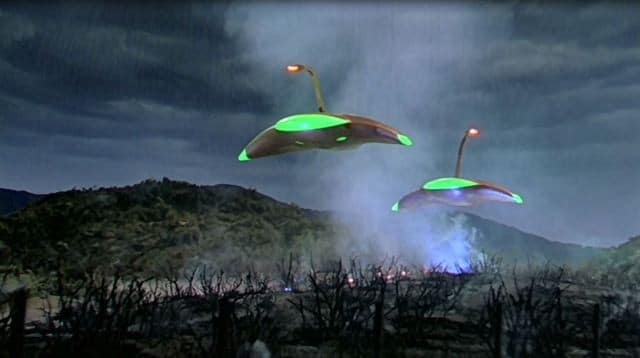
Paramount Pictures
With Ebola ravaging West Africa, and flu season quickly approaching, I can’t help but think about infectious diseases and how I will survive. In troubled times like these, I turn to movies for reassurance. No, I’m not talking about watching Outbreak and realizing that saving the world from an airborne Ebola-like pandemic is as simple as catching a monkey in the suburbs, or watching Steven Soderbergh’s Contagion and realizing that bats and pigs (and Gwyneth Paltrow) are the worst biological enemies known to man.
Instead, I look to more traditional science fiction and realize that while diseases lay waste to large segments of the human population, they may also be our saving grace from alien invasion. After all, that’s the plan that H.G. Wells laid out in “War of the Worlds,” which was adapted into films in 1953 and 2005.
While Wells (along with George Pal and later Steven Spielberg) warned us of potential dangers from life on other planets, he also assured us that our own microbes might keep us safe from atmospheric intruders. After all, it was these microscopic organisms that disabled and eventually wiped out the invading Martians.
And that got me thinking: Could the microbes here on Earth save us from an alien invasion?
The Answer: Screw the virus! Bacteria is our friend.
Whether microbes would have an impact on alien life has many different variables. If you look at the simplest form of microbe – the virus – the aliens would be pretty safe. Viruses aren’t complete organisms themselves. Rather, they are strands of genetic material (either DNA or RNA) that use a host’s cells to replicate. Viruses enter the body and inject their genetic material into the host’s cells. When there is enough virus present in the host’s system, the host becomes contagious and can spread the virus to others. In this sense, they are hard-wired to our own genetic code. If that genetic code is not present, viruses cannot do their work.
Sure, there are plenty of instances of viruses jumping from one species to another, like Ebola which seems to transmit from the bat population into the human population. However, all life on this planet follows the same genetic code, so this lays the groundwork for this transition to take place.
So, viruses are out of the running to save humanity. However, there are still plenty of other microbes that can cause a living organism problems, and plenty – from bacteria to parasites – that can hop from species to species.
Bacteria, in particular, comprise one of the largest disease-causing organisms on the planet. They differ from viruses, however, by being single-cell organisms with their own means of reproduction. Rather than using a host’s cells to reproduce, bacteria can thrive inside a body and replicate until they are scattered thickly throughout the host’s system. The symptoms of a bacteria infection can be the presence of the bacteria itself, resulting in fever, diarrhea, sweating, fatigue, coughing and sneezing in order to expel the microbes from the body. However, severe reactions can also result from toxins and waste products from the bacteria itself.
In this sense, bacteria have a more general mode of attack. In fact, some have suggested that human being are simply innocent bystanders who become inadvertent victims of the bacteria’s presence when it’s finding a nice, warm place to grow. This concept was affectionately called “shit happens” by Emory University microbiologist Bruce Levin.
Other microbes like protists and fungi can cause infections using similar processes as bacteria. They don’t necessarily need a genetic code match to survive in an organism; they just need a welcoming environment, and invading aliens might be a home for them.
Still, if they had to have at least marginally similar biology…
Aren’t we pretty much doomed?

Paramount Pictures
Not necessarily. Who’s to say that our biological history is not connected to that of Mars, where the invading aliens call their home in the book and films? Back in 1996, a meteorite that had been kicked off the Martian surface was discovered to have traces of possible microbial life on it. NASA suggested the microbes were 3.6 billion years old, and while there was no genetic material left to examine, it’s conceivable that our closest planetary neighbor may have had similar life to that which was swimming in Earth’s primordial soup.
This actually coincides nicely with the War of the Worlds stories. Aside from Mars being the aliens’ home planet, Steven Spielberg’s film suggested that the aliens had already been to Earth and had left technology buried under the surface. The two planets could have shared microbes in a similar way. It is not inconceivable that a meteorite from Mars could have carried genetic material from one planet to another to seed the origin of life.
Recent discoveries have found that not only can some microbes survive in the harsh environment of space, but that this journey could make them more potent than terrestrial forms of the same species. Some bacteria have been found to survive spacecraft clean rooms, meant to wipe out all microbial life upon returning to Earth. Russians discovered plankton on the hull of the International Space Station, which appears to have found its way 420 kilometers into space after being kicked up from the oceans through the atmosphere. Making matters worse, the extreme temperatures along with radiation and the punishing vacuum, appear to turn on a genetic switch to make these space bacteria into extremely powerful spores.
This might result in bacteria not just jumping the species barrier, but also jumping the planetary barrier, and that presents the very scary concept that the invading aliens might be the bacteria themselves. Even more terrifying is this possibly happening with viruses. The Pandoravirus has the largest genetic strand of any virus. However, only a scant six percent of that genetic material has any recognizable relationship with any other known organism on this planet. Did this genetic material come from some other place with vastly different organisms? Frequent Ancient Aliens guest Giorgio A. Tsoukalos would say, “Is such a thing even possible? Yes it is.”
So, Earth-bound bacteria – or bacteria cooked up on the walls of a space station that returns to Earth more powerful than before – could possibly be devastating to an invading species of aliens.
Of course, if that doesn’t work, there’s always a different kind of virus…
A computer virus?
Twentieth Century Fox
If there’s anything that movies teach us, it’s that a little bit of archaic technology and a whole boatload of human innovation can solve something even as monumental as an alien invasion – like when Jeff Goldblum uses his genius-level satellite-technician computer knowledge in ID4 to write a virus that takes down the entire intergalactic army. Surely if our own cesspool of microbes doesn’t chase off alien invaders, a geek with a PowerBook ought to be able to get the job done.
Of course, the ending to Independence Day is replete with problems, from back-engineering a computer when microchip technology was decades off of the Roswell crash to an alien computer evolving into Windows and Macintosh operating systems.
But then again, this is Jeff Freaking Goldblum. The guy can play piano while he rips off 80s-era Geena Davis’ panties. He can stammer Shakespeare and make it sound as if it were actually written that way. With Jeff Goldblum in charge, the human race would easily survive.
That is, as long as he has intimate knowledge of the alien computer code he only learned the night before, and as long as he had time to write an undetectable virus that would ravage an entire network of interstellar drones, and as long as he could merge the 90s-era Mac OS7 with said alien computer system, and as long as the mother ship doesn’t have any form of virus or malware protection, and as long as the alien never once updated their hardware or software in 50 years.
Yeah, unlikely in the extreme. Our only hope for survival is that the aliens all contract super-syphilis.
Click here to solve More Movie Mysteries
Related Topics: Steven Spielberg
